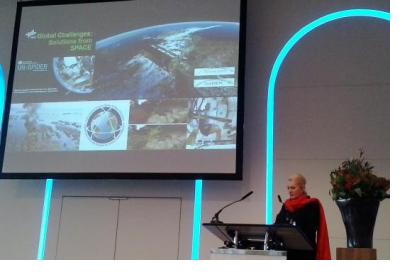The German Aerospace Center (DLR) inaugurated the DLR Conference on Climate Change 2016 to provide a discussion forum on the considerable challenges in atmospheric climate research, on ways in which space and atmospheric research can support the requirements of climate protection and to identify tools and methods for a continuous monitoring process to ensure adherence to climate change agreements. The Conference, conducted in collaboration with United Nations Office for Outer Space Affairs, (UNOOSA), has brought together more than seventy international scientists from research centers and space agencies and experts from UN entities such as the United Nations Framework Convention on Climate Change (UNFCCC) and the World Meteorological Organization (WMO). The conference, carried out in the historic Flora Conference Center of the Botanical Gardens of Cologne from 5 to 7 April 2015, is expected to facilitate the identification of tools and methods for a continuous monitoring process to ensure adherence to climate change agreements.
Opening remarks were provided by Prof. Dr. Pacale Ehrenfreund, Chair of the Executive Board of DRL, by Prof. Dr. Hansjoerg Dittus, member of the Executive Board of DLR and head the Space Research Division at DLR; and Mr. Luc St. Pierre on behalf of UNOOSA.
In his opening remarks, Prof. Dittus indicated that the conference would address important challenges in the area of climate change that can benefit from the use of space applications; including ways to monitor Essential Climate Variables (ECVs), to monitor adherence to the climate change agreements, and on ways in which the spectrum of operations of the International Space Station could be widened to contribute to atmospheric observations.
In a complementary fashion, Mr. St Pierre of UNOOSA made reference to the efforts of UNOOSA to enhance the use of space-based technologies in the context of the 2030 development agenda that has been established in 2015 through the launch of the Sustainable Development Goals, the Paris Climate Change Agreement and the Sendai Framework for Disaster Risk Reduction. Mr St Pierre also made reference to the UNISPASE+50 effort chaired by UNOOSA that will address those issues that need to be incorporated as a way to update the global governance of space activities in the context of the peaceful uses of outer space.
The Conference will include sessions on several topics including state of the art and major challenges related to climate change, improving our knowledge of the climate system, remote-sensing for climate change, and detecting and projecting anthropogenic climate change.

